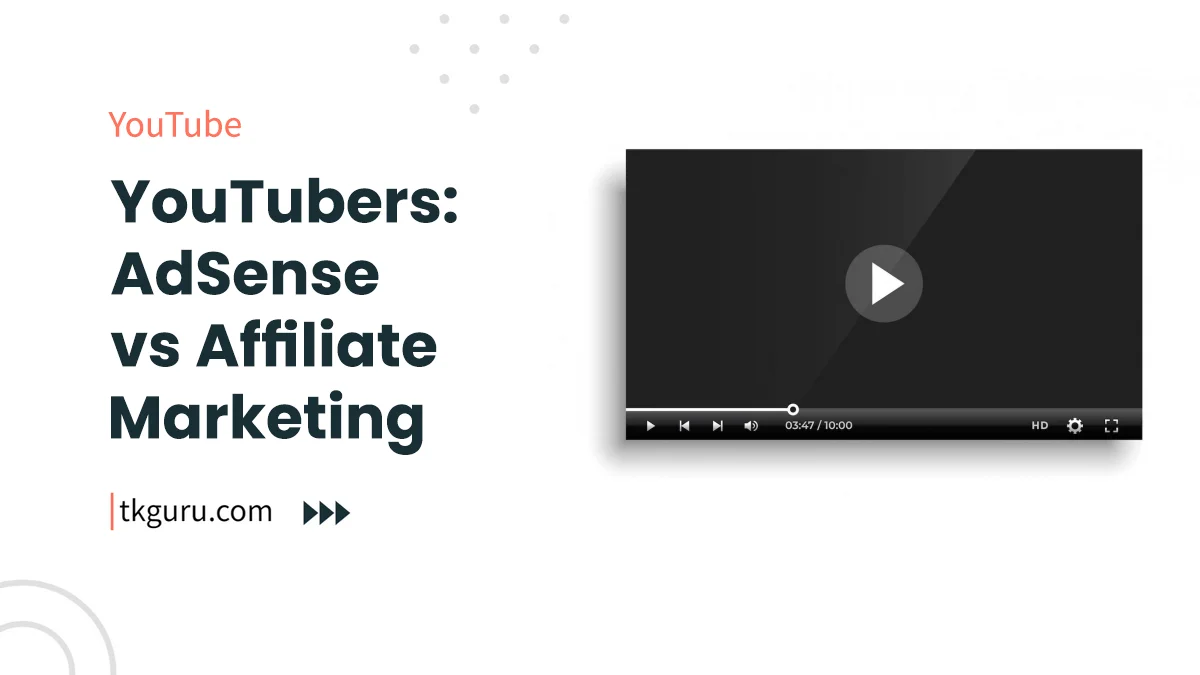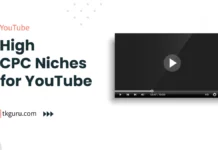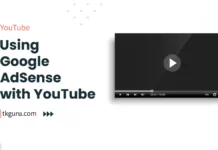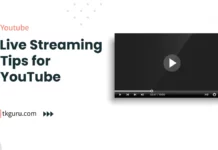Advertisements
Ratings

AdSense vs Affiliate Marketing: YouTube – Monetization is a vital consideration for YouTubers looking to turn their passion into a viable source of income.
In the vast landscape of earning opportunities, the decision between utilizing Google AdSense or diving into affiliate marketing can significantly impact your revenue potential.
In this comprehensive guide, we will dissect the two approaches, analyze their advantages and disadvantages, and provide insight into selecting the most suitable strategy for your specific goals and audience.
Contents
1. Exploring AdSense
Google AdSense is a well-established monetization method that allows YouTubers to earn revenue by displaying ads on their videos.
This method is based on two primary metrics: ad impressions and ad clicks. Essentially, you earn a portion of the revenue when viewers see the ads, and additional revenue when viewers click on them.
Table: Pros and Cons of AdSense
| Pros | Cons |
|---|---|
| Predictable revenue based on ad impressions | Lower earnings per click compared to affiliate marketing |
| No direct sales effort required | Limited control over ads displayed |
| Suitable for various content types |
Advantages of AdSense
One of the main advantages of AdSense is its predictability. You can estimate your revenue based on the number of ad impressions your videos receive.
This is especially beneficial for YouTubers who want a consistent income stream without relying on the ups and downs of sales.
Furthermore, AdSense requires minimal direct sales effort. You don’t need to actively promote products or convince viewers to make purchases. Instead, you focus on creating valuable content, and AdSense handles the rest.
Disadvantages of AdSense
However, AdSense does have its drawbacks. While the revenue from ad impressions is predictable, the earnings from clicks are generally lower compared to affiliate marketing. Each click generates a fraction of what a successful affiliate sale might bring in.
Another limitation is the limited control over the ads displayed on your videos. Google’s algorithm determines the ads shown, which might not always perfectly align with your content or your viewers’ interests.
2. Exploring Affiliate Marketing
Affiliate marketing involves promoting products or services through unique affiliate links. When someone makes a purchase using your link, you earn a commission on the sale. This method allows YouTubers to leverage their influence and recommend products they genuinely believe in.
Table: Pros and Cons of Affiliate Marketing
| Pros | Cons |
|---|---|
| Potential for higher earnings per sale | Earnings depend on successful sales |
| Control over promoted products and content alignment | Requires more effort in product research and promotion |
| Opportunity to align with audience interests |
Advantages of Affiliate Marketing
Affiliate marketing boasts the potential for higher earnings per sale compared to AdSense.
While a single ad click might bring a small amount, affiliate commissions can be a substantial portion of a product’s cost. This is particularly advantageous when promoting higher-ticket items.
With affiliate marketing, YouTubers have full control over the products they choose to promote. This allows for a seamless alignment between the promoted products and the content of your videos.
It also enables you to cater to your audience’s preferences and needs, enhancing the authenticity of your recommendations.
Disadvantages of Affiliate Marketing
Despite its potential for high earnings, affiliate marketing is not without challenges. The main hurdle is that your earnings depend on the success of the sales generated through your affiliate links. If your viewers do not convert into customers, your revenue might be limited.
Affiliate marketing also demands more effort in terms of product research, crafting persuasive recommendations, and ensuring that your promotions resonate with your audience. This extra effort can be rewarding but requires dedicated time and resources.
3. Choosing the Right Strategy
When selecting between AdSense and affiliate marketing, it’s essential to assess several critical factors that can influence your decision.
1. Audience Demographics and Interests
- AdSense: If your audience is diverse with varied interests, AdSense can be a suitable choice. The range of ads displayed caters to different viewers.
- Affiliate Marketing: If your audience has specific preferences or needs, affiliate marketing allows you to target their exact interests with relevant product recommendations.
2. Content Type and Niche
- AdSense: This method is versatile and works well with various content types and niches, making it a great fit for channels with diverse topics.
- Affiliate Marketing: If your content naturally integrates with products or services, such as tech reviews or fashion hauls, affiliate marketing can be seamless and authentic.
3. Content Creation Capabilities and Time Investment
- AdSense: Maximizing AdSense revenue often requires consistent content creation to increase the number of ad impressions.
- Affiliate Marketing: Engaging in affiliate marketing demands more time spent on product research, crafting persuasive recommendations, and creating content that seamlessly integrates with affiliate promotions.
4. Personal Preferences and Goals
- AdSense: If you prefer a steady income without the need for direct sales efforts, AdSense aligns with your goals.
- Affiliate Marketing: If you enjoy exploring and promoting products, and if you’re comfortable with the idea of your earnings depending on sales, affiliate marketing might be more suitable.
4. Case Studies
Case Study 1: Successful AdSense Strategy – Travel Enthusiast A
YouTuber A is a travel enthusiast with a channel dedicated to sharing inspiring travel vlogs, destination guides, and adventure stories. A’s content appeals to a diverse audience of travelers, armchair explorers, and culture enthusiasts. Let’s take a closer look at how A successfully implements an AdSense strategy.
Channel Focus and Content Strategy:
- A’s channel is consistently updated with visually stunning travel vlogs from around the world.
- The videos showcase picturesque landscapes, cultural experiences, and practical travel tips.
AdSense Monetization Approach:
- A’s content has broad appeal, resulting in a significant number of views and ad impressions.
- AdSense becomes an effective monetization method due to the sheer volume of viewers.
Advantages of AdSense for A:
- Predictable Revenue: With a consistent flow of views, A can rely on a steady income from ad impressions.
- Diverse Audience: A’s varied content appeals to travelers of all types, resulting in a wide range of ad topics.
Challenges of AdSense for A:
- Lower Earnings per Click: A’s content might receive numerous clicks, but each click generates a relatively lower revenue compared to affiliate marketing.
Case Study 2: Thriving with Affiliate Marketing – Tech Guru B
YouTuber B is a tech guru who specializes in in-depth tech reviews, tutorials, and comparisons. B’s videos cater to a tech-savvy audience seeking information about the latest gadgets and technological advancements. Here’s how B excels with affiliate marketing.
Channel Focus and Content Strategy:
- B’s channel is known for unbiased and thorough tech reviews that help viewers make informed purchasing decisions.
- B provides detailed tutorials on software and hardware features.
Affiliate Marketing Monetization Approach:
- B leverages affiliate marketing by including relevant affiliate links in video descriptions for products reviewed or mentioned.
- B is transparent with the audience, disclosing affiliate relationships.
Advantages of Affiliate Marketing for B:
- High Earnings per Sale: B’s well-informed audience trusts their recommendations, resulting in higher conversion rates for affiliate products.
- Alignment with Audience Interests: The audience appreciates B’s tailored product recommendations, enhancing the value of the content.
Challenges of Affiliate Marketing for B:
- Dependence on Conversions: B’s earnings rely on the audience’s willingness to make purchases through the provided affiliate links.
- Effort in Promotion: B invests time in researching and selecting products, creating persuasive recommendations, and aligning content with promotions.
Conclusion
These case studies demonstrate how YouTubers A and B leverage different monetization strategies to maximize their revenue potential.
A’s AdSense strategy benefits from a broad audience, resulting in consistent income from ad impressions.
On the other hand, B’s affiliate marketing approach capitalizes on their expertise and trustworthiness within a specific niche, leading to higher earnings per sale.
5. Tips for Effective Monetization
Monetizing your YouTube channel involves more than just slapping ads and affiliate links onto your videos.
To maximize your earnings and provide value to your audience, consider implementing these tips for effective monetization.
5.1 Optimizing AdSense Earnings
1. Choose High CPC Keywords and Niches: Focus on creating content around keywords and niches with higher Cost Per Click (CPC) rates.
Use tools like Google Keyword Planner to identify lucrative keywords that can boost your revenue potential.
2. Strategic Ad Placement: Place ads strategically throughout your videos to maximize engagement.
Experiment with various ad formats, such as skippable ads, overlay ads, and bumper ads, to find the best balance between user experience and revenue.
3. Consistency in Content Creation: Consistent content creation increases ad impressions, contributing to a more predictable income.
Regular uploads keep your audience engaged and attract new viewers, leading to higher view counts and ad exposure.
5.2 Successful Affiliate Marketing
4. Research and Select Relevant Products: Take the time to research and choose affiliate products that genuinely align with your audience’s needs and interests. Products that resonate with your viewers are more likely to result in conversions.
5. Craft Compelling Product Recommendations: Create authentic and persuasive product recommendations that highlight the benefits and features of the affiliate products. Your viewers should feel informed and excited about the products you’re promoting.
6. Transparency in Disclosure: Always transparently disclose your affiliate relationships to your audience.
Maintaining trust is crucial, and open communication about your earnings from affiliate links fosters a more genuine connection with your viewers.
5.3 Finding the Right Balance
7. Diversify Revenue Streams: Don’t rely solely on one monetization strategy. Combining AdSense and affiliate marketing diversifies your income and reduces dependency on a single source.
8. Focus on Providing Value: Regardless of your chosen strategy, prioritize creating content that adds value to your audience’s lives.
Valuable content keeps viewers engaged, leading to higher watch times and more ad exposure.
9. Know Your Audience: Understand your audience’s demographics, preferences, and pain points.
Tailor your monetization efforts to what resonates most with your viewers to increase conversions.
5.4 Analytics and Adaptation
10. Analyze Performance Metrics: Regularly monitor key metrics like AdSense revenue, affiliate link clicks, conversion rates, and watch time. These insights help you understand what’s working and what needs improvement.
11. Adapt Your Strategy: Based on your performance analysis, be ready to adapt your strategy.
Experiment with different ad placements, affiliate products, and content types to optimize your earnings.
Conclusion
Effective monetization on YouTube goes beyond the superficial addition of ads and affiliate links.
By optimizing AdSense earnings and implementing successful affiliate marketing techniques, you can strike a balance between revenue generation and audience satisfaction.
Remember that delivering value to your viewers is paramount, and maintaining their trust will lead to sustainable success in the world of YouTube monetization.
Conclusion
In the ongoing debate of AdSense versus affiliate marketing, the choice largely hinges on your goals, audience, and content.
AdSense provides a dependable stream of income based on ad impressions, while affiliate marketing presents the opportunity for more substantial earnings through successful sales.
A balanced approach might involve incorporating both strategies to diversify your revenue streams.
Ultimately, regardless of the chosen monetization strategy, understanding your audience, delivering valuable content, and fostering trust remain the cornerstones of sustainable success on YouTube.
AdSense vs Affiliate Marketing: YouTube FAQs
What Is AdSense, and How Does It Work?
AdSense is a program by Google that allows website owners and bloggers to earn money by displaying Google ads on their websites or blogs. Advertisers pay when users click on these ads, and website owners earn a portion of that revenue.
What Is Affiliate Marketing, and How Does It Work?
Affiliate marketing is a performance-based marketing strategy where individuals or businesses (affiliates) promote products or services of other companies (merchants) and earn a commission for each sale or action generated through their affiliate links.
Which Is Easier to Implement: AdSense or Affiliate Marketing?
AdSense is generally easier to implement because it only requires placing ad code on your website. Affiliate marketing can be more complex, involving finding suitable affiliate programs, promoting products or services effectively, and tracking conversions.
Which Offers Higher Earnings Potential: AdSense or Affiliate Marketing?
Affiliate marketing often has higher earnings potential because you earn a commission on each sale or lead, which can be a significant percentage of the product's price. AdSense earnings depend on factors like your website's niche, traffic, and ad placement.
Can I Use AdSense and Affiliate Marketing Together?
Yes, you can use AdSense and affiliate marketing together on your website. However, it's important to strike a balance to ensure a good user experience. Avoid overwhelming your audience with ads and affiliate links, and make sure your content remains valuable and relevant.
| Web Hosting | Website |
| WordPress | Google Adsense |
| SEO | Affiliate Marketing |
| Blogging | YouTube |
Recent Posts
- Blogging vs YouTube: Which is More Profitable?
- High CPC Niches for YouTube: Maximizing Earnings with Lucrative Content
- AdSense vs Affiliate Marketing: Which is Best for YouTubers
- Using Google AdSense with YouTube: Monetizing Your Videos
Related Tags
Adsense vs affiliate marketing for youtube, Adsense vs affiliate marketing vs youtube, google adsense affiliate marketing, clickbank, amazon affiliate program, affiliate marketing income per month, shoutmeloud affiliate marketing, affiliate marketing earning proof,






